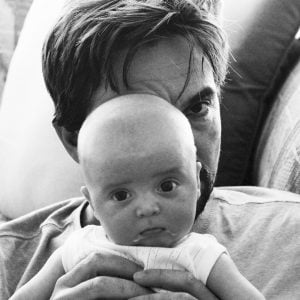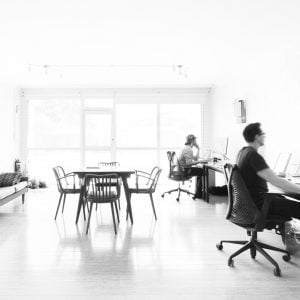As a member of the National Committee for Gender Equity and Chair of the Gender Equity Taskforce in WA, Michael Gay is well versed on the issues revolving around balancing career and family. Throw a busy practice and toddler twins into the mix, and life becomes about multi-tasking, efficiency and compromise.
The realities of part-time work
Since my two-year-old twins arrived I’ve been working four days a week, with my ‘kids day’ on Wednesday. I’m a small practice owner, which gives me the flexibility, but finding the right balance is a real challenge.
Thursday morning is a normal work day for me. The anxieties of mounting email and missed calls are always front of mind… and that’s just from one day off. It must be hard for those (predominantly women) working only two or three days a week as an architect in a part-time role.
Holding down a position with responsibility or trying to run a practice can become a compromise. Your mind is constantly in two places, which can often feel like you are doing both jobs half as well. Having said that, this is why part-time workers become so ruthlessly efficient with their time. The work done is often equal in quantity and quality to that of most full-timers in order to avoid the ‘what-ifs’ when they are away. I haven’t quite mastered that skill yet, so my fifth day of work is usually spread over the nights and the weekend – except for my ‘kids day’ on Wednesday… I’m usually a vegetable by 8pm.
Long hours = short term
The architecture long hours culture has one positive. It’s perfect preparation for newborn twins.
Fifteen hours sleep a week… easy. I won’t even mention how much sleep my wife got. I exaggerate and joke… NOTHING can prepare you for newborn twins… and the long hours culture of architecture is a short-term solution to longer term problems.
Even before the kids arrived, at MSG Architecture we were finishing off our first development. However, due to necessity, my wife and I ended up moving in to it and I was doing 14-hour days trying to finish it pre-Christmas. Our affectionately labelled kids, T1 & T2, arrived early January and the rest is a blur. The first three months were a productivity write off. The next six months were spent testing out every possible coping mechanism and eventually after a full year, I was getting somewhere.
All the while my business partner bore the load of work in my absence… without a single complaint. I was truly grateful and I can only hope to repay him someday. So, after two years, we are still in the same house (investment property became a home), I’m back to four full days at work, my wife does three full days and we have ‘bubba’ and ‘poppy’ (my parents) for two days a week. Occasionally the long hours are required but they are the exception. It’s not really an option anyway. I still struggle to deal with the fact that I cannot work as much as I need/want to. I’m becoming better at working efficiently, trusting instinct and intuition over endless planning, and accepting a bit of controlled chaos. Suzanne Hunt gave me some advice a short time ago (she has twins)… “after two years, the light at the end of the tunnel will appear”. I think I see it flickering.
Flexibility vs security vs career
A murky grey compromise is often required between these guys, or at least a list of priorities. I don’t think there is an ideal formula, it just depends on circumstance and individuals. As I go into my fifth year of MSG Architecture I’m constantly assessing the pros and cons of running a practice. Last year was tough in WA and a lot of people didn’t make it.
We survived but not without compromise. We got very financially compact (tight). Whenever I’m tempted by the regular pay check and 9 to 5 position (security), I have a look at my lifestyle as a practice owner (flexibility)… and the decision becomes clearer.
In the last two years, I’ve found myself altering my measure of success. I think everyone does this at some point and it’s not easy…. copping out? lowering the bar? settling? Are these just justifications for not being able to cope with everything?… or a pragmatic realisation that you can’t do everything at the highest level all of the time (mental health). Maybe I hire an army of helpers to do most of the stuff for me but money is the biggest barrier to that.
When you can’t afford it, it’s either you walk the dog yourself or put up with an insane dog. You wash the car yourself or learn to love a dirty car. etc. But what about the ‘false economy’. Meaning I pay others so that I can work more (career). I haven’t found the right balance yet. I pay for help for some things… but others I’ve sacrificed some time to do them… but either way, you have less money.
With whatever money I have, it’s hard to resist the temptation to expand my lifestyle to fit the container (financial capability). This is compounding and increases pressure on a small business. My thing at the moment is a new car. Both of my cars are pre-Bluetooth (my yardstick for ‘old cars’). However, I’ve measured the ramifications of a car loan on my lifestyle and decided it’s not worth it… my math indicates five hours less sleep, six less surfs and two and a half hours of additional teeth grinding per month. Besides, the best and safest car gets assigned for baby duty… not my work car.
Mental wealth
The black dog isn’t an architect. It doesn’t care what a rolling deadline is, doesn’t understand value engineering and really doesn’t give a shit about design integrity.
To my fellow architects: if you are having a tough day, month, year… it’s not all you. Our profession has a deep culture of long hours and inflexible workplaces that we are trained to think is beneficial to us. Thankfully people are trying to turn the boat around. In the meantime, go home before 10pm, see your kids, eat a decent meal and remember that (usually) no one dies if a drawing is issued a day late.
After 20+ years of wrestling with my bipolar dog, my career is still pretty much intact and i’ve taught the dog to sit, stay and briefly roll over. It still shits on the carpet occasionally though.
Much of what I’ve discussed here deals with family, work and architecture (particularly small business). I think the underlying driver for my frankness and analysis is to improve and maintain my (and others’) mental health.
I recently won the Emerging Architect Prize for WA, I believe, by being brutally honest. In a nutshell, I explained that I’d done a lot of different things in different places and, still being confused about architecture, I started a practice hoping to find better answers there. Part of the answers revolve around equitable practice, balance and mental health in our profession.
In the spirit of this, as a small business owner, holidays seem almost impossible sometimes. BUT… in 2017 my wife and I managed to get overseas to visit her family and we squeezed in a sea/tree holiday with a bit of surfing. GO ON HOLIDAY AND TAKE SOME HELP IF YOU HAVE KIDS.
Lastly, a word for the guys
The 1950s were pretty straightforward (imagine Don Draper on Mad Men). I go to work 10 hours a day, sometimes I hanker for a whiskey at my desk, dinner on the table when I get home and obedient kids that are seen and not heard.
Well, the reality is, I don’t drink because it interferes with my medication and my wife is too knackered to cook because she’s been wrangling our two modern ‘free to think’ cherubs all day.
As a guy it’s easy to get caught between these two worlds when it comes to family. There’s a very very strong (maybe primal) urge to endlessly work and ‘bring home the bacon’ so that everybody eats and goes on holidays as planned. There are no more Mongol invasions, so we are a bit lost as to how best to expend our primal urges. Truth is, a lot of women/partners are keen to share the bacon hauling in exchange for some wrangling.
Maybe we approach it like a project architect… you put your project team together, then put the consultant team together, you do 80% correct plans, you execute most of it, then deal with the variations, disputes and extensions of time as they come in. Eventually everyone gets to practical completion and all is forgotten… arbitration is a topic for someone else.
Parlour is the benchmark on equality in architecture, but I would also encourage you to get in touch with the institute’s National Committee for Gender Equity if you ever have any concerns, issues or questions. Also look out for your state-based Gender Equity Taskforce who are the boots on the ground.
Michael Gay is a Director and co-Founder of MSG Architecture. He is a member of the National Committee for Gender Equity and Chair of the Gender Equity Taskforce in WA, and won the Emerging Architect Prize for WA in 2017. Michael was also an Instagram guest host for Parlour earlier in the year and this piece is based on his very popular posts.
























